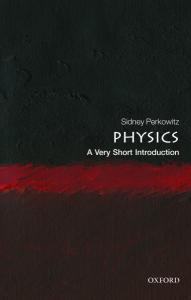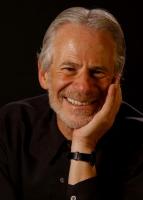
Sidney Perkowitz: Physics: A Very Short Introduction
For this column, NASW book editor Lynne Lamberg asks NASW authors to tell how they came up with the idea for their book, developed a proposal, found an agent and publisher, funded and conducted research, and put the book together. She also asks what they wish they had known before they began working on their book, what they might do differently the next time, and what tips they can offer aspiring authors. She then edits the A part of that Q&A to produce the author reports you see here.
Publication of NASW members’ reports in Advance Copy does not constitute NASW’s endorsement of their books. NASW welcomes your comments and hopes this column stimulates productive discussions.
PHYSICS: A VERY SHORT INTRODUCTION
Sidney Perkowitz
Oxford University Press, July 25, 2019, $11.95 (paperback), $7.99 (Kindle)
ISBN-10: 0198813945, ISBN-13: 978-0198813941
ASIN: B07SD5Y1H6
Perkowitz reports:
Physics: A Very Short Introduction is part of Oxford’s “Very Short Introduction” series. The 500 VSI titles present a range of topics to general readers with 10 million copies sold to date. They have inspired a New Yorker article. I learned of the series only when I came across a VSI book. I liked its inviting size and look and soon was talking possibilities with the VSI science editor.
The series included lots of science, but amazingly, it lacked a title about physics in general, which is my background. I had qualms about covering this big topic in only 30,000-35,000 words, but finally decided it would be a great writing experience. I wrote a proposal that anonymous Oxford University Press (OUP) reviewers approved.
OUP has a standard VSI contract with a specified advance and royalties so I told my agent that I would handle contract negotiations myself. It was easy to work with OUP to tune the contract including its separate budget for image rights. (I ran slightly over budget, and although I was willing to pay the difference, OUP covered it – very classy, OUP!).My goal was to write the book not as a technical work but as an accessible extended essay about physics and physicists that puts ideas over details and word descriptions over math. The writing benefitted from my access to a university research library and mostly went smoothly over 18 months while I kept up a full schedule of freelance writing. Two volunteer readers with physics backgrounds contributed good ideas about topics and presentations for general readers.
Having just finished editing another book, I had not planned to do a new one right away. But the little VSI book I saw seduced me, and the task of properly presenting lots of science in a small space energized me. If there’s a lesson here, it is that stretching to meet a challenge can be the best choice a writer could make.
Contact info:
- Sidney Perkowitz, 404-374-1470, physp@emory.edu](mailto:physp@emory.edu); perkowitzs@bellsouth.net, https://sidneyperkowitz.net/, @physp
- Book: https://global.oup.com/academic/product/physics-a-very-short-introduction-9780198813941
NASW members: will your book be published soon? Take advantage of this opportunity for shameless self-promotion. Submit your report for Advance Copy.
Tell your fellow NASW members how you came up with the idea for your book, developed a proposal, found an agent and publisher, funded and conducted research, and put the book together. Include what you wish you had known before you began working on your book, or had done differently.
See https://www.nasw.org/advance-copy-submission-guidelines.
View Advance Copy archives at https://www.nasw.org/member-article/advance-copy.
Thinking of writing a book? If you are a NASW member, you may access a list of more than 150 books and online resources to help you craft your book proposal, find an agent and funding sources, negotiate your contract, learn about self-publishing, publicize and market your book, and more at https://www.nasw.org/article/write-book.
Send book info and questions about book publishing to Lynne Lamberg, NASW book editor, llamberg@nasw.org.
Image by MikesPhotos from Pixabay
Advance Copy
The path from idea to book may take myriad routes. The Advance Copy column, started in 2000 by NASW volunteer book editor Lynne Lamberg, features NASW authors telling the stories behind their books. Authors are asked to report how they got their idea, honed it into a proposal, found an agent and a publisher, funded and conducted their research, and organized their writing process. They also are asked to share what they wish they’d known when they started or would do differently next time, and what advice they can offer aspiring authors. Lamberg edits the authors’ answers to produce the Advance Copy reports.
NASW members: Will your book be published soon? Visit www.nasw.org/advance-copy-submission-guidelines for information on submitting your report.
Publication of NASW author reports in Advance Copy does not constitute NASW's endorsement of any publication or the ideas, values, or material contained within or espoused by authors or their books. We hope this column stimulates productive discussions on important topics now and in the future as both science and societies progress. We welcome your discussion in the comments section below.


